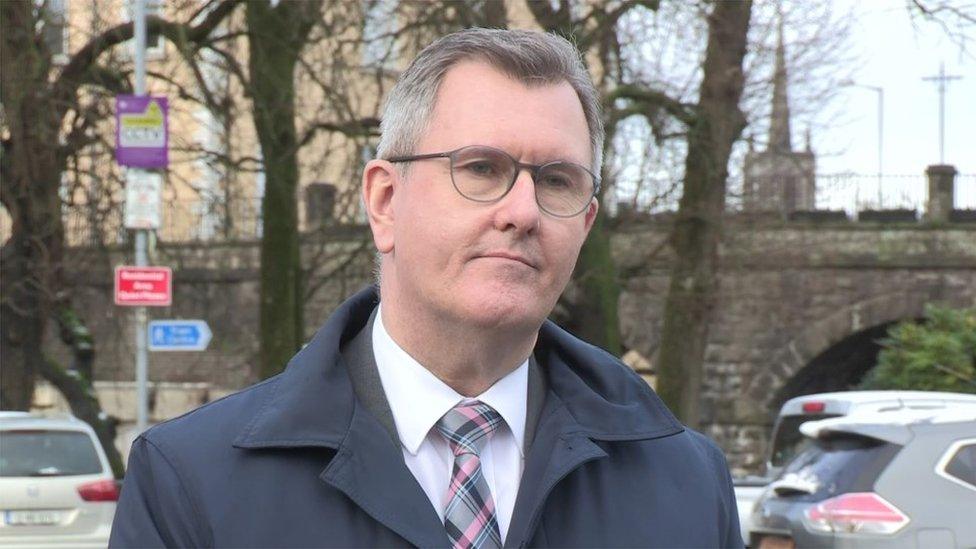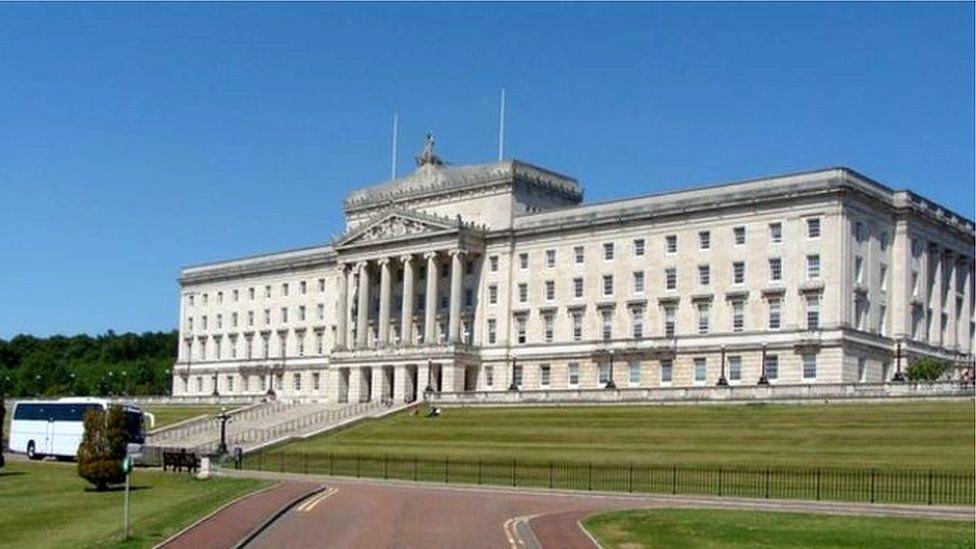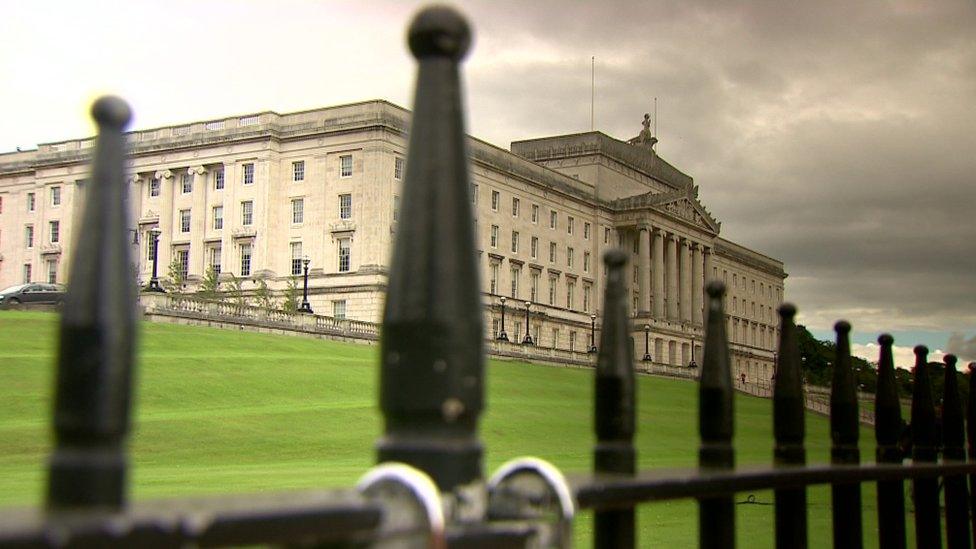Double jobbing: DUP say parties 'faking outrage' over dual mandates
- Published

MPs have not been allowed to sit at Stormont since 2016
The Democratic Unionist Party (DUP) have said other parties should "stop faking outrage" over the proposed reintroduction of double jobbing.
The plan would allow MPs to be elected to the Northern Ireland Assembly but keep their Westminster seats.
Four of the five Stormont Executive parties have said they are against the move.
A DUP spokesman said the move would "encourage stability at a time when devolution is deeply unstable".
Details of the plan were outlined in a letter from government peer Lord Caine to fellow lords on Friday.
It will bring Northern Ireland into line with the rest of the UK and is proposed to last until the next Westminster election, due in 2024.
Double jobbing, also known as dual mandates, was banned in Northern Ireland in 2016, when a number of MPs were forced to give up their seats in the assembly.
If the new proposal goes through, it would allow DUP leader Sir Jeffrey Donaldson to stand for election to the assembly in May while retaining his seat at Westminster.
Under existing rules if he was elected to Stormont he would have had to stand down as an MP, leading to a by-election in his Lagan Valley constituency.
The SDLP and Alliance Party have said their three MPs will vote against the mandate when comes to the House of Commons.
Sinn Féin's Michelle O'Neill called it "blatant and disgraceful interference", while Ulster Unionist Party leader Doug Beattie tweeted that the Northern Ireland Office was "now directly supporting DUP the election campaign".

The proposal would allow DUP leader Sir Jeffrey Donaldson to stand for election to the assembly in May while retaining his seat at Westminster
On Sunday, a DUP spokesman said other parties in Northern Ireland were "throwing dust in the air".
"This proposed step by the government would bring Northern Ireland into line with other parts of the United Kingdom and encourage stability at a time when devolution is deeply unstable because of a one-sided and undemocratic Protocol," he continued.
"It was first proposed by the SDLP's sister party in the House of Commons before Sir Jeffrey was Leader of the DUP.
"Therefore if parties are surprised, they were asleep at the wheel when this was being discussed in the House of Commons."


Multi-tasking has never been a problem for our politicians.
Why have one job when you can have two, or maybe three?
Ian Paisley and John Hume, for example, were for many years simultaneously members of the House of Commons, the European Parliament and the Northern Ireland Assembly.
For a while in the 1980s, the North Down MP James Kilfedder was famously paid more than the prime minister when he was also speaker of the assembly.
And for years after Stormont returned post-1998, the vast majority of Northern Ireland's 18 MPs also held seats in the assembly and some even had third roles as executive ministers.
It was the political norm until the expenses scandal hit Westminster and trust in politicians hit rock bottom.
In the public outcry which followed, the acceptable dual mandate was re-labelled unacceptable double jobbing.
Ironically, the man who helped draw up the rules ending the practice here, Lord Caine, is the same man who has laid out the plan to bring it back now in a time-limited way.

The plan was proposed by Lord Alderdice during a committee stage reading of the NI (Ministers, Elections and Petitions of Concern) Bill on Wednesday.
Lord Alderdice, who quit the Alliance Party in 2006, external and is now a Liberal Democrat peer, argued that dual mandates would encourage easier transitions between serving in London and Belfast, and benefit the Northern Ireland Assembly.
Former UUP leader Lord Trimble and former DUP deputy leader Lord Dodds spoke in favour of the move in the House of Lords.
However, former SDLP leader Baroness Ritchie said that while there was a case to be made for the amendment, she was strongly opposed to double jobbing.
In his letter, Lord Caine said he was opposed to the possibility of double jobbing remaining indefinitely so the amendment was reworked with a time limit.
The Lords are due to consider the amended proposal this week.

Alliance MP Stephen Farry said the plan was "out of touch with public opinion"
Alliance deputy leader Stephen Farry said the move was "a backwards step" and that the party's former leader Lord Alderdice made "a fundamentally poor judgement call" to propose the reintroduction of double jobbing.
Mr Farry told BBC's Sunday Politics show that the move coming so close to an election amounted to "interfering with democratic process".
The North Down MP said Lord Alderdice "does not speak for the Alliance Party, does not represent them".
He said members of the House of Lords who supported the proposal were "out of touch with public opinion here in Northern Ireland, which is very much against this move".
"We've been told all along this legislation is about faithfully implementing the New Decade, New Approach agreement and putting in place provisions for that new legislative provision," he said.
"There has not been any proper consultation with Northern Ireland parties on this particular development bar a few members of the House of Lords who do not represent mainstream views.
"The government has acted beyond their remit."
'This is not fair'
Ulster Unionist assembly member Mike Nesbitt said he was "nearly speechless" at the proposal which "goes totally against [the] spirit of what we tried to do" to share power in Stormont.
The Strangford MLA accused the government of "going out of its way to prop up and support the DUP".
"Why did we stop it six years ago, why are we bringing it back now and why are we making it time limited? I think the answer is obvious, to help out the DUP," he said.
"There are five parties in government and the spirit of the Belfast Good Friday Agreement is that it is fair to all five.
"This is not fair to all five."
A spokesperson from the Northern Ireland Office said the proposals would be "subject to the usual parliamentary scrutiny".
"The government's proposal is for any dual mandates to be strictly time limited to the subsequent Westminster election.
"It will enable the smoother transition between legislatures should an MP wish to take a seat in the NI Assembly, and therefore supports the objectives of the bill in promoting greater stability," the spokesperson said.
- Published14 January 2022

- Published15 January 2022
